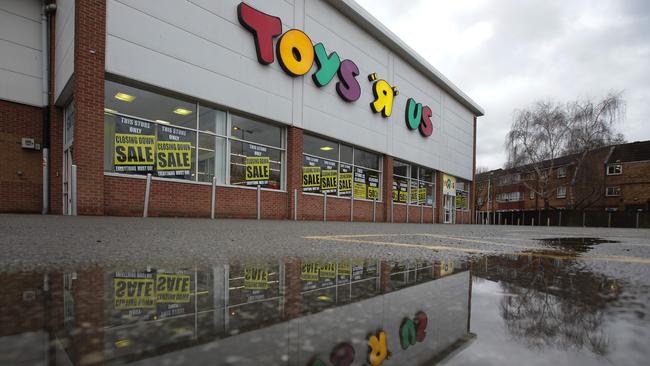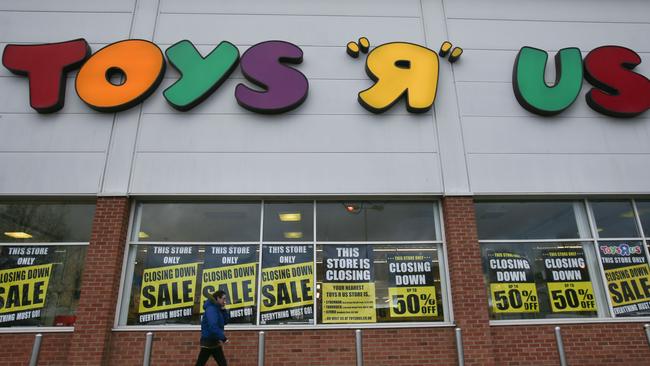The real reason Toys R Us went bust
IT WASN’T Amazon, nor was it consumer spending, there was a far more insidious reason the toy retailer went belly up.

TOYS R Us is Toys R Bust. The company has entered Chapter 11 bankruptcy and has begun closing more than 1000 stores in the US and UK.
The company’s Australian arm insists it is business as usual but, when a retailer fails, all the talk is about the effect of Amazon and weakening consumer confidence.
But there was another reason why the 70-year-old Toys R Us found itself plummeting over the retail precipice: private equity.
Toys R Us was owned by private equity (PE) investors and they often have a singular and laser-sharp focus — to make money, and make it fast.
In retail, that strategy has seen many casualties.

Following a spell in PE custodianship, both Myer and Dick Smith floated on the stock market raking in vast sums for their investors. For both, the good times didn’t last long.
Myer’s share price is today one-tenth of what it was at its float in 2009. Dick Smith went belly up in 2015 in a process which one fund manager called the “greatest private equity heist of all time”.
Mark Humphrey-Jenner, a finance professor at UNSW, told news.com.au that PE’s retail reputation had been sullied.
“These high profile retail failures certainly look bad for PE. The particular concern with Toys R Us appears to be the company was saddled with too much debt and this was unsustainable.”

DEBT FIXED, BUT GAINS UNLIMITED
John Vaz, who teaches corporate finance at Monash University and used to be in the industry, was more blunt.
“They play a hard game, a very tough game and they make their money.
“PE is often huge net worth individuals who invest in specialised funds that will use a lot of leverage (debt) to acquire an asset.
In 2005, while in rude health, Toys R Us was snapped up by a consortium including PE firms KKR, Bain Capital and property company Vornado. In today’s money, the price tag was a not to be sniffed at AU$9.63 billion.
But the three firms actually only put in $1.7 billion of their own cash.
How does that work out? The answer was debt. Debt that Toys R Us was saddled with.
“You may have $1 million, you borrow another $3 million and you control a company worth $4 million,” said Mr Vaz. The company that has been bought has to pay off the debt used to buy it.
“The debt is fixed but the gains are potentially unlimited. PE are not there for the long term, so they want an exit strategy to pay off the debt and collect the gain.”
Toys R Us was saddled with a cool AU$6bn of debt following its purchase, costing it AU$320 million a year to service.
“That saps out a lot of cash flow from the company. Toys R Us didn’t make the investment in online, competing online or generating an attractive customer experience,” said Mr Humphrey-Jenner.
Toys R Us also had to pay some $600 million in fees to the consortium who purchased it.

SWEAT THE ASSETS
A favourite strategy of PE firms is to quickly turn the company around and sell it off for a huge profit, said Mr Vaz.
“They buys companies that are fat so they can sweat the assets. It might be they can sell off properties and convert that into leases to free up balance sheet.”
That was the case with Myer’s iconic Bourke St store that was sold by the firm’s PE owners TPG. Staff cuts are another strategy.
Anchorage paid Woolworths $20 million upfront, and a promise of $80 million later. Woolworths, who’d struggled for years trying to turn around the electronics store, couldn’t dump Dick quick enough.
A year later, just before its float, Dick Smith was worth $520 million.

WINDOW DRESSING
Mr Vaz called the apparent miraculous turnaround “window dressing” to create the perception of a long term value and growth.
In Dick Smith’s case, a massive sale to clear inventory and a spate of store openings to boost sales all helped to bolster the bottom line.
“Like with Dick Smith or Myer, in 2009, you get top dollar, retire your debt, and you’ve made money,” he said.
But, in Dick Smith’s case it was all a mirage. Less than two years after it floated Dick Smith went to the wall.
Yet, the two cases are not identical. Toys R Us was never floated by its PE owners and it could have survived if the retail world was the same as in 2005, Mr Vaz said.
But within just a few years, the retail world went through a transformation. Shoppers migrated online and the price they were willing to pay for Barbies and bikes plummeted.
Annual sales in the US fell from US$13.7 billion in 2008 to $11.5 billion last year. Profits were as shadow of their former selves.
With its huge debt to pay off, there was nothing left in the kitty for the never ending retail rainy day.

TOYS R US WOES BIGGER THAN PRIVATE EQUITY
In retrospect, said Mr Humphrey-Jenner, retail was always a questionable play for PE.
“Retail margins are very low so even a well-run company will have difficulty.”
That doesn’t mean PE is bad for all businesses, he said, pointing to Spotify. There is plenty of PE money in the streaming service, a US$1 billion float is in the works and there are expectations the company will continue to succeed.
In many cases, PE has worked well. Fresh owners, with a steely perspective, can shake up bloated companies and make them fit for the future.
Indeed, Mr Vaz said a good retailer, with a good customer proposition and unique niche, could do well whoever owned it.
Retailers Adairs and Repco have been through periods of PE ownership and continue to operate.
“When it comes to retailers, I’m a tech junkie and I still shop at JB. But what’s the unique offer with Toys R Us that you can’t get elsewhere?

“PE play a hard game, a tough game and they make their money. Now as an investor I want it to be like that, but as an employee maybe I don’t like them — but they have a role to play,” he said.
“PE firms can be patient investors if they can see companies can be improved but if they don’t feel that’s the case, they will look at early exits and minimise the downside.”
Mr Vaz had a warning to anyone thinking of investing in a PE owned firm heading to the stock market. Do your homework. Do the promises stack up? Is that retailer really worth 10 times that it was a year ago?
Unlike at Dick Smith, where Anchorage walked away with hundreds of millions of dollars, Toys R Us’ owners haven’t been so lucky.
Their investments tanked before they could recoup their cash. Although the fees they have collected over the years should keep them in Lego and Hatchimals.
Toys R Us’ former employees won’t be so lucky.
In a statement on Thursday, Toys R Us Australia said it remained open. “We are working through a range of options for our business locally and as always will relentlessly strive towards bringing fun, joy and happiness to the hearts and minds of our customers for many more years to come.”




